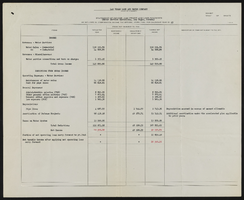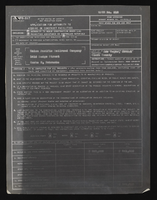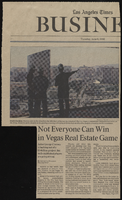Search the Special Collections and Archives Portal
Search Results

Transcript of interview with Geoconda Arguello Kline by Claytee D. White, September 18, 2014
Date
2014-09-18
Archival Collection
Description
Geoconda Arguello Kline is the first female Secretary Treasurer of the Culinary Union Local 226. She got there the hard way. Beginning as a maid, then union organizer, director, ten years as President, and then the in 2012, she attained the highest office in the local. Arguello Kline left Nicaragua in 1979 as a political refugee and settled in Miami. The wages there did not allow her to take care of her family so she moved to Las Vegas following family members who had taken union jobs upon their arrival. She joined as well and worked as a guest room attendant for eight years. After becoming an organizer, she organized and walked picket lines whenever necessary. She is adamant that striking is the last thing that workers want to do. Her longest strike and the longest one Culinary Union history was the Frontier. The strike lasted for six years, four months, and ten days. Geoconda feels honored to be a member of the Culinary Union Local 226. ”It is a testament to our diverse and incredible members that has put me her. We undoubtedly have challenges ahead, but I’m confident that we will overcome by working as a union.” I’m sure that this quote by her in 2012 holds true today.
Text

Transcript of interview with Jeanne Maxwell William by Claytee D. White, July 7, 2016
Date
2016-07-07
Archival Collection
Description
Foxhunting may be the Sport of Kings but was also found among the elite in Michigan. In the early 1960s when Jeanne Williams married Ed Wilson, son of Charles Wilson, President of General Motors, she learned the art of riding to the hounds. She left that life for Las Vegas in 1965. During the heyday of Las Vegas, Williams reared her daughter, Christine, on the Desert Inn Country Club working as an artist and sculptor. The Summa Corporation’s job as Women’s Events Coordinator wooed her. She kept the wives of golfers busy with luncheons featuring speakers like Ann Landers and David Frost. These women were also treated to fabulous gifts including designer purses. But soon Williams was swept off her feet by Jack Kent Cooke, one-time owner of the Los Angeles Lakers. She moved with him to Virginia where her art suffered. Jeanne’s return to Las Vegas allowed her artistic canvas to expand with commissions from the town’s movers and shakers. This time, home was the Sahara Country Club and then in 1994, the Canyon Gate Country Club. Those homes gave her space for her art. Her artistry and skill as a sculptor were keenly honed during this period as she joined the prestigious Desert Sculptors Association and the illustrious Las Vegas Watercolor Society. Actress, singer, dancer, painter, sculptor Jeanne Maxwell Williams helped to start the arts movement in Las Vegas.
Text

Transcript of interview with Arte Nathan by Claytee White, December 11, 2014
Date
2014-12-11
Archival Collection
Description
Arte Nathan is trained in Human Resources. He evolved the thinking in the casino industry to allow management and labor to work for the best interests of both. Educated at Cornell University, he worked with Jim Wilhelm of the Culinary Workers Union Local 226 to develop an unusually profitable relationship that served the casino owner and the people who maintained the cleanliness of the property. “Look, before I got here it was Al Bramlet. I mean the strike of '84 is something that's indelibly etched in all of our minds. The strike in '86 in Atlantic City was much the same. But that type of contentious labor relations is not the future. And there are progressive companies all over the U.S. whether it's General Motors or Ford or Steve Wynn and Mirage Resorts. That's really the story. Are there disconnects along the way? Are there fights and arguments and egos? Of course, there are. But the overriding story of the Culinary Union in Las Vegas between 1980 and 2014 is that they forged a different relationship, a different model that was unique and successful and helped people to live and achieve their dreams. You don't often get that opportunity.” “I'm not the smartest guy in any room. Never have been and I never will be. But I'm willing to try. I'm willing to be open. I have an opinion and I'll fight with my opinion; you fight with yours because two heads are better than one.” He made room for the disabled, ex-felons, and drug addicts. Arte believes that no person is better than another.
Text
Excalibur Hotel and Casino construction progress shots: video
Date
1989 to 1990
Archival Collection
Description
Construction progress shots of the Excalibur Hotel and Casino. Taken across the street From the MGM, the video begins with the two main hotel towers and ends with construction of the "castle" center building nearly completed. Camera stays zoomed out mostly, occasionally pans in to see construction workers outside the building. Original media U-matic S, color, aspect ratio 4 x 3, frame size 720 x 486. From the Production Company Audiovisual Collection (MS-00930) -- Digitized audiovisual material file.
Moving Image
Pagination
Refine my results
Content Type
Creator or Contributor
Subject
Archival Collection
Digital Project
Resource Type
Year
Material Type
Place
Language
Records Classification






